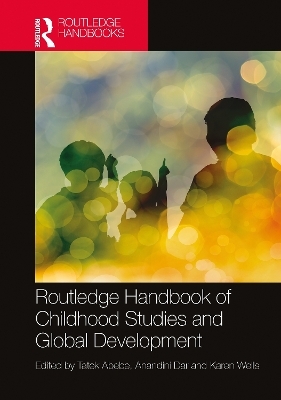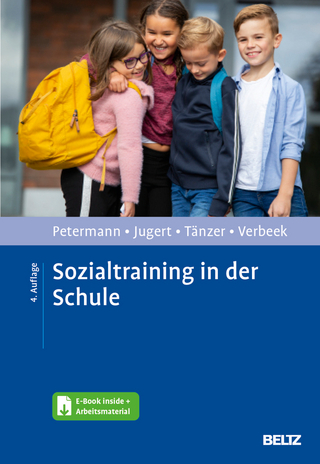
Routledge Handbook of Childhood Studies and Global Development
Routledge (Verlag)
978-0-367-74043-6 (ISBN)
This Routledge Handbook of Childhood Studies and Global Development explores how global development agendas and economic development influence children’s lives. It demonstrates that children are not only the frequent targets or objects of development but that they also shape and influence processes of development and social change in diverse and meaningful ways.
The handbook makes the case for the importance of placing children at the heart of development
debates, examining the complex social, historical, cultural, economic, epidemiological, ecological, geopolitical, and institutional processes transforming what it means to be young in the world today. Through reports on field research as well as a critical engagement with theories in development studies and childhood studies, contributions unravel the structural connections of global development processes as they relate to children’s life worlds. They tease out and tease apart how global developmental processes influence children’s lives, how children inform and shape development, why it is important to keep children at the centre of debates linked to development and socio- cultural change, and ways of engaging children in development research, policies and practices.
Showcasing research from both established scholars and early career researchers, and with particular prominence given to the work of authors from the global south, this handbook will be an essential reference for policymakers, practitioners, and for researchers and students across childhood studies, education, geography, sociology, and international development.
Tatek Abebe is a Professor of Childhood Studies at the Norwegian University of Science and Technology, where he teaches postgraduate courses on cultural epistemologies of childhood, development, global south childhoods and youth, participatory methodologies and ethics. His ethnographic research examines how young people are affected by and shape the political-economic environment they inhabit, with an emphasis on their activism, inter-generational relationships, care, livelihoods, labouring and learning. Anandini Dar is Associate Professor at the School of Liberal Studies, BML Munjal University (BMU). She is the co-founder and co-convener of the Critical Childhoods and Youth Studies Collective (CCYSC), and serves as the advisory board member of The Childism Institute, at the Rutgers University, USA. She also serves on the international editorial board of the journal Children’s Geographies, Taylor & Francis, and is the Series Editor of Studies in Childhood and Youth for Palgrave Macmillan. Dr. Dar’s areas of research intersect childhood studies, development studies, sociology, education, and feminist studies. She has published on the topics of children’s rights, politics, migration, de-colonialism, and youth. Karen Wells is a Professor of International Development and Childhood Studies at Birkbeck, University of London. She has over twenty years of experience in research on the intersection between international political economy and socio-cultural fields in the formation of childhood. She has published widely on this research.
Childhood Studies and Global Development - Introduction Section 1: Researching Childhood and Development 1. Section Introduction 2. The Dispersed Child: Indian Children and their Archival Presence in Missionary Collections 3. Development Research with Children from A Decolonial Perspective: Experimentation with Knowledge and Learning to Think Otherwise 4. Participatory Knowledge Co-Generation with Children: Ethics and Politics of Engagement 5. Ethics and Consent in Research with Children and Young People in Global Development 6. Visual Research 7. Using a Mixed Methods Approach to Identify Pathways to Adolescent Girl Empowerment Section 2: Political activism and development 8. Section Introduction 9. Political Socialization in Militarized State: Youth in Armed Conflict of Indian Administered Kashmir 10. New Readings for Palestinian Children and Youth’s Experiences During the British Mandate: the Birth of Children’s Political Agency 11. “Capitalism Doesn’t Empower Me”: Latin American Children’s Activism and Critiques of Neoliberal Development 12. Children as Environmental Actors: a Generational Perspective on Climate Activism in an Overheated World 13. Colombian Child-Soldiers and Their Status as Political Actors Section 3: Migration, Children, and Development 14. Section Introduction 15. Exclusionary Locales of Migration and Education in India: Situating Heterogeneous Manifestations of NGO Schooling 16. Children’s health and well-being in the context of parental migration: the case of Southeast Asia 17. The Politics of Unaccompanied Child Migration at the U.S./Mexico Border 18. Transnational Migration and Childhood, Social Reproduction and Economic Crisis Section 4: Health, Gender Norms, and Development 19. Section Introduction 20. Sexual Violence Against Children 21. Navigating Social and Gender Norms in Early Childhood - a Case Study in a Flood-Prone Area in Amazonian Peru 22. Influence of Policies on Early Adolescent's Sexual and Reproductive Health 23. Sexuality, Bodies and Desire through the Schooling of Girls 24. Children and Adolescents Living with and Affected by HIV in African Countries: Converging Crises, Vulnerability, and Resilience Section 5: Governing Childhoods: Law and Rights 25. Section Introduction 26. Child Rights Governance in International Development 27. The Politics of Child Rights: Protecting the “World-Child”, Governing the Future 28. The Global Politics of Child Labour: A Critical Analysis 29. Disability and Education Under Conflict and Crisis in the Global South 30. Explaining Variation in Compliance with Anti-FGM and Child Marriage Law in Burkina Faso 31. A Critical Reflection on Ghana’s Childhood, Child Rights and Child Labour Governance Modalities: A Case Study of Abolitionist Discourses and Practices on Children’s Work in the Fishing Sector Section 6: Childhood and Social Reproduction 32. Section Introduction 33. Gendered Navigations of Space, Work and Education in Young Adivasi Lives in India 34. ‘Skilling’ Educated Youth for Insecure Employment in the Informal Economy 35. Mothers’ Reflections on Generational Changes in Childhood in a Mayan Town: Globalisation Challenges to Convivencia/Togetherness 36. Children as Agents of Change to Reach the Water Security Sustainable Development Goal in the Climate Crisis 37. Early Childhood Education in Turkana Pastoralist Communities of Kenya 38. From Post-Development to Post-Schooling: Rethinking Educational Pathways with Agro-pastoralists in Southwest Ethiopia Section 7: Culture, Childhood and Development 39. Section Introduction 40. Language Policy, Development and Translanguaging in Africa 41. Children’s Play Cultures in West Africa 42. The Role of Videogames in The Socio-Cultural Life of Children in Peru 43. Sport for Development 44. Resisting State-Sponsored Oppression through Applied Theatre: A Brazilian case study
| Erscheinungsdatum | 22.08.2024 |
|---|---|
| Zusatzinfo | 7 Tables, black and white; 16 Line drawings, black and white; 8 Halftones, black and white; 24 Illustrations, black and white |
| Verlagsort | London |
| Sprache | englisch |
| Maße | 174 x 246 mm |
| Gewicht | 1330 g |
| Themenwelt | Geisteswissenschaften ► Psychologie ► Pädagogische Psychologie |
| Sozialwissenschaften ► Pädagogik ► Vorschulpädagogik | |
| Sozialwissenschaften ► Soziologie ► Spezielle Soziologien | |
| ISBN-10 | 0-367-74043-5 / 0367740435 |
| ISBN-13 | 978-0-367-74043-6 / 9780367740436 |
| Zustand | Neuware |
| Informationen gemäß Produktsicherheitsverordnung (GPSR) | |
| Haben Sie eine Frage zum Produkt? |
aus dem Bereich


